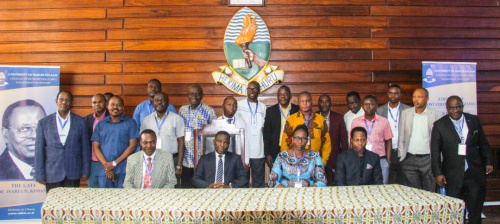UDSM writes a seldom book on the History of Post-colonial Tanzania
By Dotto Kuhenga, Communication and Marketing Office,
The University of Dar es Salaam History Department is finalizing the writing of a comprehensive History of Post-Colonial Tanzania book to be launched next year, it was recently told.
This was announced at a conference in honour of former University of Dar es Salaam don, the late Prof. Isaria N. Kimambo, which was organized by the UDSM History Department from 21 to 22 July, 2022 at the University of Dar es Salaam.
Speaking at the launching of the two-day conference, the Chair of the editorial team for the anticipated book, Dr. Salvatory S. Nyanto, said that although Tanzania has received a great deal of scholarly attention, there remains no readily accessible and concise history of postcolonial Tanzania that would be analogous to this work.
“This project has, therefore, attempted to fill that void by bringing together new and innovative research on postcolonial Tanzania. We are indeed grateful to all researchers who have joined their hands in our pursuit of making this scholarly intervention a reality”, said Dr. Nyanto.
Dr. Nyanto pointed out that a great number of researchers from science, social sciences, humanities and law have turned out to contribute in this new book which “is dedicated to the Late Professor Isaria Ndelahiyosa Kimambo, the first Tanzanian Professor of History and the long-serving Chief Academic Officer (today, the Deputy Vice Chancellor-Academic) of the University of Dar es Salaam.”
The new book will be titled, ‘A History of Post-Colonial Tanzania: Essays in Honour of Prof. Isaria N. Kimambo’. According to Dr. Nyanto, Prof. Kimambo was “the doyen, eminent, dynamic historian, friend, and colleague who was central to shaping the production of historical knowledge at Dar es Salaam” and that Department faculty and researchers within and outside Tanzania have been shaped by his scholarly inquisitiveness, mentorship, and support.
In his opening address, the University of Dar es Salaam Vice Chancellor, Professor William Anangisye, commended the efforts made by the authors that will result in the production of a very significant and long-awaited book of a comprehensive history of postcolonial Tanzania.
“The range of book chapters submitted to the project shows that you have not hugged your historical knowledge like personal prize possessions. Instead, you have thrown it into the pool of wisdom to be used in Tanzania and beyond”, said Prof. Anangisye.
According to Dr. Nyanto, the chair of the editorial team, the new book will cover various aspects such as post-colonial Tanzania, its neighbors and the external world; livestock development, urbanization and population dynamics; literary productions in post-colonial Tanzania; and development in law and dispensation of justice.
Other aspects include post-colonial foreign policy, culture, religion and social identity; education in post-colonial Tanzania; multipartyism, political leadership and public administration in post-colonial Tanzania; and financial institutions and cold war politics in post-colonial Tanzania.
Other News
Sun, 10.Nov.2024 : UDSM na UH vyafanikisha upatikanaji wa Kamusi ya Kihispania-KiswahiliFri, 08.Nov.2024 : UDASA Bonanza 2024 picks up vibes
Fri, 01.Nov.2024 : Robotics Bootcamp attracts hundreds of young talents to UDSM, sparks passion for Physics and Technology
Wed, 30.Oct.2024 : Dr. Jackson Justo drives AI-powered energy innovations for sustainable future
Thu, 24.Oct.2024 : Partnership with NMB promises innovation, talent development and digital transformation at UDSM
Wed, 09.Oct.2024 : Economics don Dr. Innocensia John is named among 2024 top Agri-Food Pioneers
Tue, 08.Oct.2024 : School of Mines and Geosciences gears up for Helium exploration in Tanzania
Sat, 05.Oct.2024 : UDSM students excel in 2024 NGEA Award Regional Challenge



